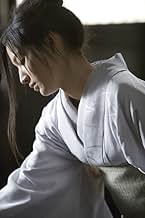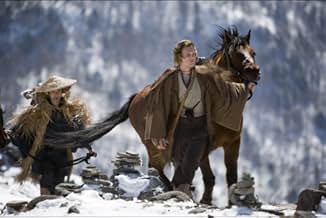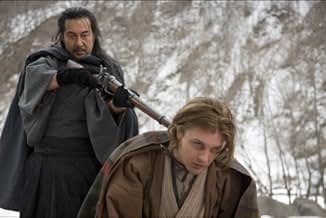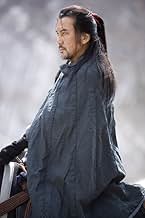VALUTAZIONE IMDb
5,8/10
11.925
LA TUA VALUTAZIONE
Nella Francia del XIX secolo, un commerciante sposato di bachi da seta si reca in Giappone. Una malattia spazza via la fornitura di seta africana e durante il suo soggiorno diventa ossession... Leggi tuttoNella Francia del XIX secolo, un commerciante sposato di bachi da seta si reca in Giappone. Una malattia spazza via la fornitura di seta africana e durante il suo soggiorno diventa ossessionato dalla concubina di un barone locale.Nella Francia del XIX secolo, un commerciante sposato di bachi da seta si reca in Giappone. Una malattia spazza via la fornitura di seta africana e durante il suo soggiorno diventa ossessionato dalla concubina di un barone locale.
- Regia
- Sceneggiatura
- Star
- Premi
- 7 vittorie e 5 candidature totali
Alexander Brooks
- M. Loiseau
- (as Leslie Csuth)
Recensioni in evidenza
Silk was a flop, not the international success its backers had hoped for after the director's The Red Violin made such a splash a decade earlier. It is worthy of attention, in pinpointing some cautionary messages to other would-be Visionary (that recently overworked term) filmmakers.
1. TRAVELOGUE: Film is unfortunately a highly literal, through visuals, medium, and it is easy to become mesmerized by the shots. Mature directors scrupulously avoid this pitfall, but perhaps Canadian director Francois Girard has subconsciously assimilated the approach of Terrence Malick. Like Malick, he only ventures forth from his artistic cave once a decade, and feels compelled to make each shot the most perfect and beautiful of all time. This is not cinema -this is "how I spent my vacation" -a $20,000,000 slide show.
2. FOOLED BY THE RUSHES: It could be a by-product of the far-flung co-production status (Silk is structured officially as a Canadian/Italian/Japanese project, an unusual combo), but the movie displays an age-old problem of Hollywood, caused by over-monitoring of the rushes. Many a stiff, stolid film result has looked "marvelous" in the dailies. Studios traditionally made decisions like director firings or bringing in a troubleshooter to haul in the reins on a project based on the quality of the rushes. This makes sense in a bean-counter universe, but has nothing to do with the ultimate movie, which as Hitchcock noted, is stored in the director's head. Watching Silk I was struck that the rushes coming back from the various locations truly must have looked fabulous, but that is no indicator that they would ultimately amount to anything in a gestalt sense. Only the director and his editors know what will be needed in terms of coverage, and how the pieces might mesh into a whole. It's easy to get bamboozled by striking shots, just as at the other extreme it's easy to assume the worst when a neophyte director falls behind schedule and isn't giving the execs their daily meters of processed celluloid.
3. DISTANCING: Brecht and Godard have long been the inspiration for film directors to keep the audience at a safe distance -break up the naturally hypnotic effect that a movie has for the viewer, which Hitchcock exploited to a fare-thee-well. In Silk, Girard uses the crutch of voice-over narration to sabotage one's involvement in the action/dialog/story. Like Zentropa, another pretentious exercise by a wannabe "visionary" director, the somnolent narration literally puts the viewer to sleep. His insistence on oft-criticized bland American accents for French characters further abstracts the story, and makes it near-impossible to smoothly enter into the life of the protagonists. Low affect is the instruction to lead Michael Pitt and even Alfred Molina, the latter bringing professional life to his rattled off exposition, and even some wit. Keira Knightley gets to actually emote in her patented shy-but-effusive manner, but I noticed the director cutting away from her as quickly as possible, and even though she is the key central figure of the story's romantic theme, her overall screen time is reduced to the bare minimum. The dialog by Girard and Michael Golding is almost all in the form of recitations: never sounding natural or using vernacular. That's as big a mistake as the bland American accents.
4. CRYPTIC: Adapting a novel is difficult; perhaps this is why the Academy gives a separate Oscar category for adaptations as opposed to the Original Screenplay niche for the Woody Allens of the world. Too often a film (or TV) adaptation REQUIRES that the viewer be not just conversant but well-nigh totally immersed in the source work in order to appreciate the film. (I recently watched the British TV series A Dance to the Music of Time, via Netflix, after a marathon reading of all 12 Powell novels it's based upon, and the damn thing would have made no sense whatsoever without having the books fresh in my mind.) For Silk, many basic and virtually all nuanced elements are lost without knowledge of the source, a damning fault. The intended purity of not subtitling the Japanese dialog segments falls squarely into this problem area too. The movie should stand alone, and if it can't, why bother? It's not impossible -everybody's favorite of all-time The Godfather saw Coppola creating a work of art that never requires one to go back and read Mario Puzo's pulp novel.
5. THE PITT FACTOR: Folks love to criticize young Mr. Pitt, an actor who future generations will scratch their heads over: "how did he get into so many films?". Pauly Shore, Phillips Holmes in the '30s, and many 4-F performers like Sonny Tufts and William Prince during WW II come to mind. Following the death of James Dean, for over a decade innumerable folks imitated his breakthrough persona, of which I recall Michael Parks and Christopher Jones becoming the most typecast. Now we have Mr. Pitt, the lookalike thespian doomed to live in the shadow of Leonardo DiCaprio, let alone his equally handsome namesake Brad. What a cross to bear!
6. UNLOCKING THE MYSTERY: I was reminded of Werner Herzog's overlooked classic Heart of Glass while watching Silk. Both films have transcendentally beautiful landscapes. Underneath the main romantic and cross-cultural themes, they have the same core parable: a one-industry community (Glassblowing in Herzog, Silk creation here) poised on the edge of disaster. Herzog hypnotized his cast to get a unique, otherworldly effect. Girard has Pitt & most others sleepwalking, to null effect.
1. TRAVELOGUE: Film is unfortunately a highly literal, through visuals, medium, and it is easy to become mesmerized by the shots. Mature directors scrupulously avoid this pitfall, but perhaps Canadian director Francois Girard has subconsciously assimilated the approach of Terrence Malick. Like Malick, he only ventures forth from his artistic cave once a decade, and feels compelled to make each shot the most perfect and beautiful of all time. This is not cinema -this is "how I spent my vacation" -a $20,000,000 slide show.
2. FOOLED BY THE RUSHES: It could be a by-product of the far-flung co-production status (Silk is structured officially as a Canadian/Italian/Japanese project, an unusual combo), but the movie displays an age-old problem of Hollywood, caused by over-monitoring of the rushes. Many a stiff, stolid film result has looked "marvelous" in the dailies. Studios traditionally made decisions like director firings or bringing in a troubleshooter to haul in the reins on a project based on the quality of the rushes. This makes sense in a bean-counter universe, but has nothing to do with the ultimate movie, which as Hitchcock noted, is stored in the director's head. Watching Silk I was struck that the rushes coming back from the various locations truly must have looked fabulous, but that is no indicator that they would ultimately amount to anything in a gestalt sense. Only the director and his editors know what will be needed in terms of coverage, and how the pieces might mesh into a whole. It's easy to get bamboozled by striking shots, just as at the other extreme it's easy to assume the worst when a neophyte director falls behind schedule and isn't giving the execs their daily meters of processed celluloid.
3. DISTANCING: Brecht and Godard have long been the inspiration for film directors to keep the audience at a safe distance -break up the naturally hypnotic effect that a movie has for the viewer, which Hitchcock exploited to a fare-thee-well. In Silk, Girard uses the crutch of voice-over narration to sabotage one's involvement in the action/dialog/story. Like Zentropa, another pretentious exercise by a wannabe "visionary" director, the somnolent narration literally puts the viewer to sleep. His insistence on oft-criticized bland American accents for French characters further abstracts the story, and makes it near-impossible to smoothly enter into the life of the protagonists. Low affect is the instruction to lead Michael Pitt and even Alfred Molina, the latter bringing professional life to his rattled off exposition, and even some wit. Keira Knightley gets to actually emote in her patented shy-but-effusive manner, but I noticed the director cutting away from her as quickly as possible, and even though she is the key central figure of the story's romantic theme, her overall screen time is reduced to the bare minimum. The dialog by Girard and Michael Golding is almost all in the form of recitations: never sounding natural or using vernacular. That's as big a mistake as the bland American accents.
4. CRYPTIC: Adapting a novel is difficult; perhaps this is why the Academy gives a separate Oscar category for adaptations as opposed to the Original Screenplay niche for the Woody Allens of the world. Too often a film (or TV) adaptation REQUIRES that the viewer be not just conversant but well-nigh totally immersed in the source work in order to appreciate the film. (I recently watched the British TV series A Dance to the Music of Time, via Netflix, after a marathon reading of all 12 Powell novels it's based upon, and the damn thing would have made no sense whatsoever without having the books fresh in my mind.) For Silk, many basic and virtually all nuanced elements are lost without knowledge of the source, a damning fault. The intended purity of not subtitling the Japanese dialog segments falls squarely into this problem area too. The movie should stand alone, and if it can't, why bother? It's not impossible -everybody's favorite of all-time The Godfather saw Coppola creating a work of art that never requires one to go back and read Mario Puzo's pulp novel.
5. THE PITT FACTOR: Folks love to criticize young Mr. Pitt, an actor who future generations will scratch their heads over: "how did he get into so many films?". Pauly Shore, Phillips Holmes in the '30s, and many 4-F performers like Sonny Tufts and William Prince during WW II come to mind. Following the death of James Dean, for over a decade innumerable folks imitated his breakthrough persona, of which I recall Michael Parks and Christopher Jones becoming the most typecast. Now we have Mr. Pitt, the lookalike thespian doomed to live in the shadow of Leonardo DiCaprio, let alone his equally handsome namesake Brad. What a cross to bear!
6. UNLOCKING THE MYSTERY: I was reminded of Werner Herzog's overlooked classic Heart of Glass while watching Silk. Both films have transcendentally beautiful landscapes. Underneath the main romantic and cross-cultural themes, they have the same core parable: a one-industry community (Glassblowing in Herzog, Silk creation here) poised on the edge of disaster. Herzog hypnotized his cast to get a unique, otherworldly effect. Girard has Pitt & most others sleepwalking, to null effect.
This is a beautiful film.
The story stays very close to the book I had already read twice (around 10 years ago then 6 months ago). The adaptation is faithful to the author, and even if there's not much words, the intensity of the feelings is always present. The actors convey these feelings very well, with deep sensitivity and great sensuality (just watch when Hervé is in the Japanese wooden tub, and the girl pours water on his face and lips with her fingers). The settings and sceneries are overwhelming: there's so much beauty-like the snow covered trees in Japan, the Joncour garden, ... François Girard had already shown how a fantastic Director he is with his 2 previous films, and now with Silk! He has such a strong aesthetic sense, and a great way to direct actors...
The story stays very close to the book I had already read twice (around 10 years ago then 6 months ago). The adaptation is faithful to the author, and even if there's not much words, the intensity of the feelings is always present. The actors convey these feelings very well, with deep sensitivity and great sensuality (just watch when Hervé is in the Japanese wooden tub, and the girl pours water on his face and lips with her fingers). The settings and sceneries are overwhelming: there's so much beauty-like the snow covered trees in Japan, the Joncour garden, ... François Girard had already shown how a fantastic Director he is with his 2 previous films, and now with Silk! He has such a strong aesthetic sense, and a great way to direct actors...
If Fate would have it, I would have the opportunity to go to Tokyo for this year's Japanese International Film Festival, and watched this as the closing film. Initially I had mixed this up with Atonement, also starring Keira Knightley in a period romance story, except that this one had shades of The Last Samurai thrown in, with the love triangle moments with the involvement of a Japanese girl.
Based on the novel by Alessandro Baricco, Silk takes its name from the Silk trade, where a French village looks to having its economy hit, if not for Alfred Monlina's Baldabiou who ventures into opening a silk mill and employing the townsfolk. However, in need of untainted silkworm eggs, free from an epidemic striking Europe, he sends overseas one of his staff Herve Joncour (Michael Pitt), whom is indebted to him for arranging his marriage with Knightley's Helene, and off he goes on the arduous journey first to Africa, then to the land of the rising sun, now in the impending stage of internal strife.
The journeys are probably the best bits in the movie, with lush landscapes filling the screen in all serenity of the turmoils that are yet to come. I thought director Francois Girard tried to ape Terence Mallick's direction, with lush natural beauty punctuated with voice over narration of the character's inner-most thoughts. We learn a lot of what's going on in Herve's mind, as he tells us the story of his being, and the conflict he faces when he gets tempted to committing adultery, never forgetting about his tryst overseas when back home he has a lovely wife to go home to.
While the movie has that central conflict that provides the fuel to propel the movie forward, somehow it never gets utilized, having the story and characters dance around on the sidelines of the issue, never to take it head on. This adds to the frustration of watching the deliberations that they have, made worse as the movie chooses to unfold itself extremely slowly, taking too much of its own sweet time. Fans of Keira Knightley would have watched this movie solely to see her performance after the Pirates double bill, but sadly, even though she's given top billing, her screen time is limited, as the spotlight falls on Michael Pitt's Herve and we are told of this story through his eyes.
What adds to the annoyance as well, is that the movie is sans English subtitles. Having it set in France but the characters speaking in English is understandable (after all, Pitt is American and Knightley is English), but having the Japanese speak in their native tongue, and not providing the subtitles, removes a layer that would have provided probably a deeper understanding of the movie. Yes, granted we are supposed to feel the pain of Herve in his inability to connect with the people and the one he loves, but I don't feel that this should be done at the expense of understanding, especially for non-Japanese speaking folks.
However, despite its obvious flaws, the movie redeems itself with a powerful end, packing quite a punch especially when you think it's headed nowhere and probably into mediocrity. Suddenly you discover that things are again not always what they seem, and wonder just who the bigger fool is. But the bottomline, if there's a message to be taken away from this movie, is again never to give in to temptation, and truly treasure your loved ones. Tried and tested, clichéd but true.
Based on the novel by Alessandro Baricco, Silk takes its name from the Silk trade, where a French village looks to having its economy hit, if not for Alfred Monlina's Baldabiou who ventures into opening a silk mill and employing the townsfolk. However, in need of untainted silkworm eggs, free from an epidemic striking Europe, he sends overseas one of his staff Herve Joncour (Michael Pitt), whom is indebted to him for arranging his marriage with Knightley's Helene, and off he goes on the arduous journey first to Africa, then to the land of the rising sun, now in the impending stage of internal strife.
The journeys are probably the best bits in the movie, with lush landscapes filling the screen in all serenity of the turmoils that are yet to come. I thought director Francois Girard tried to ape Terence Mallick's direction, with lush natural beauty punctuated with voice over narration of the character's inner-most thoughts. We learn a lot of what's going on in Herve's mind, as he tells us the story of his being, and the conflict he faces when he gets tempted to committing adultery, never forgetting about his tryst overseas when back home he has a lovely wife to go home to.
While the movie has that central conflict that provides the fuel to propel the movie forward, somehow it never gets utilized, having the story and characters dance around on the sidelines of the issue, never to take it head on. This adds to the frustration of watching the deliberations that they have, made worse as the movie chooses to unfold itself extremely slowly, taking too much of its own sweet time. Fans of Keira Knightley would have watched this movie solely to see her performance after the Pirates double bill, but sadly, even though she's given top billing, her screen time is limited, as the spotlight falls on Michael Pitt's Herve and we are told of this story through his eyes.
What adds to the annoyance as well, is that the movie is sans English subtitles. Having it set in France but the characters speaking in English is understandable (after all, Pitt is American and Knightley is English), but having the Japanese speak in their native tongue, and not providing the subtitles, removes a layer that would have provided probably a deeper understanding of the movie. Yes, granted we are supposed to feel the pain of Herve in his inability to connect with the people and the one he loves, but I don't feel that this should be done at the expense of understanding, especially for non-Japanese speaking folks.
However, despite its obvious flaws, the movie redeems itself with a powerful end, packing quite a punch especially when you think it's headed nowhere and probably into mediocrity. Suddenly you discover that things are again not always what they seem, and wonder just who the bigger fool is. But the bottomline, if there's a message to be taken away from this movie, is again never to give in to temptation, and truly treasure your loved ones. Tried and tested, clichéd but true.
Adapted from a rather short but great novel, they had space to expand it in the movie but didn't make the most of it. It has nice cinematography, a good soundtrack (with a beautiful main theme used in trailers), solid base story and good acting by Kiera Knightley. However, it's a love story and I wasn't moved by the romantic aspects one bit. I think the main fault lies with the main actor who just didn't convey emotions well enough. He looks good but seriously lacks in acting chops, at least in this one. The chemistry between the actors was also severely lacking. The pace was slow, which can sometimes work in period pieces to improve the atmosphere, but unfortunately here it was mostly a detriment. It might be worth a rental but I would pick other period romantic stories first.
Rating: 5 out of 10
Rating: 5 out of 10
This movie tries to be an epic, period piece romantic drama. It has some of the main ingredients that are required to pull this off. There's costumes, travels, some beautiful (that's the only reason I gave it a 2/10) landscape shots, a guy, women, a not-too-subtle score to pull big emotions from us, all are present. But the most important ingredient they forgot: there's no heart. There's no passion. There's no chemistry at all. They even didn't take time to develop the Love between the main characters. Guy sees girl in bar (2 seconds). Then they walk past some flowers. Girl likes flowers. Guy eats a flower. They are in love. Sadly, I do not make this up. It is this shallow. And this is supposed to be the base for the rest of the movie. Well, it's just completely unbelievable. The dialogues are cheesy clichés and completely uninspired ("I will always love you" every time the guy goes on a trip; 4 times?), the acting is borderline amateuristic. Watching a movie can be a wonderful experience, it can draw you in, it can get under your skin, can touch something deep inside. This movie wants to be/ do all of that, but it fails completely. Bad movie making. A waste of time.
Lo sapevi?
- QuizMiki Nakatani, who played Madame Blanche, is an actress/singer. In 1995 Nakatani and the composer Ryuichi Sakamoto collaborated and recorded a song titled "Aishiteru, Aishitenai", in which they sang together.
I più visti
Accedi per valutare e creare un elenco di titoli salvati per ottenere consigli personalizzati
- How long is Silk?Powered by Alexa
Dettagli
- Data di uscita
- Paesi di origine
- Sito ufficiale
- Lingue
- Celebre anche come
- Silk
- Luoghi delle riprese
- Ronciglione, Viterbo, Lazio, Italia(Garden Scenes)
- Aziende produttrici
- Vedi altri crediti dell’azienda su IMDbPro
Botteghino
- Budget
- 20.000.000 USD (previsto)
- Lordo Stati Uniti e Canada
- 1.103.075 USD
- Fine settimana di apertura Stati Uniti e Canada
- 126.537 USD
- 16 set 2007
- Lordo in tutto il mondo
- 7.965.682 USD
- Tempo di esecuzione1 ora 47 minuti
- Colore
- Mix di suoni
- Proporzioni
- 2.35 : 1
Contribuisci a questa pagina
Suggerisci una modifica o aggiungi i contenuti mancanti
































